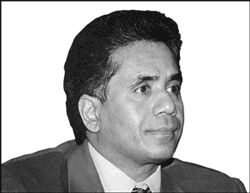Rabi Bhakta Shrestha is president of the FNCCI, and managing director of the NE Group, whose interests include the joint venture with Hindustan Lever. Nepali Times spoke with him recently on the business climate of the country, and the need for professionalism in business and transparency in government.
 Nepali Times: You've taken over the Federation of Nepalese Chambers of Commerce and Industry (FNCCI) at a time when doing business in Nepal is becoming more difficult than ever. How does it look from your seat?
Nepali Times: You've taken over the Federation of Nepalese Chambers of Commerce and Industry (FNCCI) at a time when doing business in Nepal is becoming more difficult than ever. How does it look from your seat?
Rabi Bhakta Shrestha: The last few months have, I think, been the most difficult time in our living memory. Things are difficult not only for us, but for the entire country. Things are unclear, we cannot say how long this difficult phase will last. Our worry is that government does not have the money to pay for security and if security doesn't improve, we can't say how bad things will get. Industry can't withstand any more taxes because we've already had a very bad year. Government should worry more about providing stable governance and a predictable polity. We need political commitment to rebuild the economy, and no government can run when the economy is in tatters.
NT: What are the three most important improvements needed?
RBS: The three top things that need a priority solution, in my view, are: a) improvement in the security atmosphere-there should be a solidly felt perception that the security situation has improved; b) the credibility of the government's policies-matching deeds with words-should be proven by implementation and good governance; and c) the government should guarantee that the policies once made will be continued for a reasonable period of time. Moreover, the government should take the private sector into confidence before revising economic policy, which needs to be done, taking into account the current situation.
NT: Are you hopeful things will improve in the medium-term?
RBS: I am a born optimist. I think things cannot get any worse. Now, they should start to improve. I hope the government, political parties, the industry and business community, and civil society have all learnt their lessons. Realising the consequences of our past mal-performance, we should proceed with new vigour.
NT: Isn't part of the problem the unprofessional approach of even those said to be captains of industry?
RBS: One can always blame the entrepreneurs. Even when government policy abruptly changes and a venture that was a good proposition until yesterday becomes unviable today, one can blame the entrepreneur and say \'why couldn't they forecast the change in policy'. Having said that, I do not feel everything is all right with our businessmen or "captains of industry", as you call them. The lack of professionalism in business is also due to our government policies, and social beliefs, and our value system. It seems not to reward professionalism.
NT: What is the FNCCI's position on financial sector reforms?
RBS: No doubt, these are needed. Our banks and other financial institutions should be made to follow modern rules and norms. But we need to make our institutions capable of following them. The Nepal Rastra Bank unilaterally, without proper discussion and deliberation, brings out such policies. But we are the party most affected, we think our genuine concerns should be heard, we should be consulted before being surprised with some new initiative. The NRB's policy implementation needs to be transparent and accountable.
NT: But isn't reforming the financial sector the first step towards improving the investment climate?
RBS: No doubt, but bringing in stringent, idealistic rules and procedures alone will not improve the investment climate. The key is implementing policies and good governance. Besides, there are questions of security and other incentives-why should investors come to Nepal if they get better deals in India and China?
NT: How are your own businesses, including your joint ventures, doing?
RBS: My business, like the entire Nepali economy, is suffering from the recession. Our business volume is down, especially in our joint venture, Nepal Lever Limited. Exports of toothpastes and soaps have gone down.
NT: What is the FNCCI doing about its other problem-the renewal of the Nepal-India trade treaty?
RBS: We have been working with our partner organisation, the Confederation of Indian Industries (CII), on this front. Had the government taken our proposal seriously in the first instance, I think the problem would have been solved by now. But bygones are bygones, and we are still working with the CII. The FNCCI-CII Joint Economic Committee is meeting this week. The Indian prime minister's visit to Nepal and what he said during the SAARC Summit indicate that things can be sorted out by 5 March.
NT: You had an audience with the king recently, what did you talk about?
RBS: It was a great learning experience for me and I am deeply indebted to His Majesty for the opportunity. I briefed His Majesty about the business and economic situation in the country. He was very worried about the economy and said that we are all first Nepalis and then businessmen, and it is in the interest of all of us to make things better together. He seemed fully aware of our national ills and we discussed possible corrective measures.
NT: Did you discuss business? The king also was in business until some time ago, how do you assess his understanding of the problems you now face?
RBS: We did not discuss any particular business. The discussion was focused on the overall business climate. I found His Majesty very keen to learn about the problems faced by Nepali businesses and the concerns of people in business. He has a very good grasp of the issues facing Nepal and its businesses. His Majesty time and again stressed the need to put out national duties and obligations first.


